Elliott W. David
INTERVIEWS AND SUCH
Index
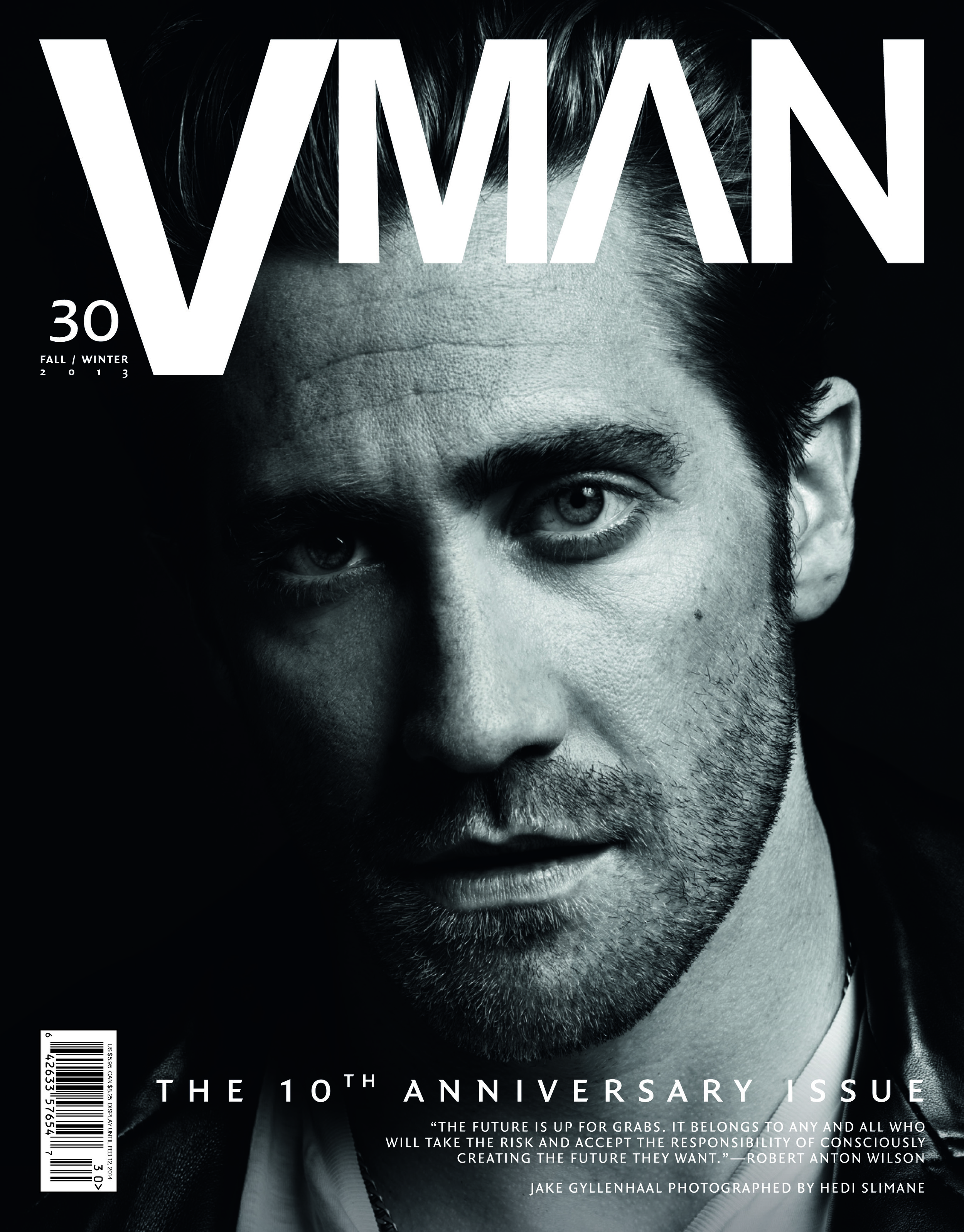
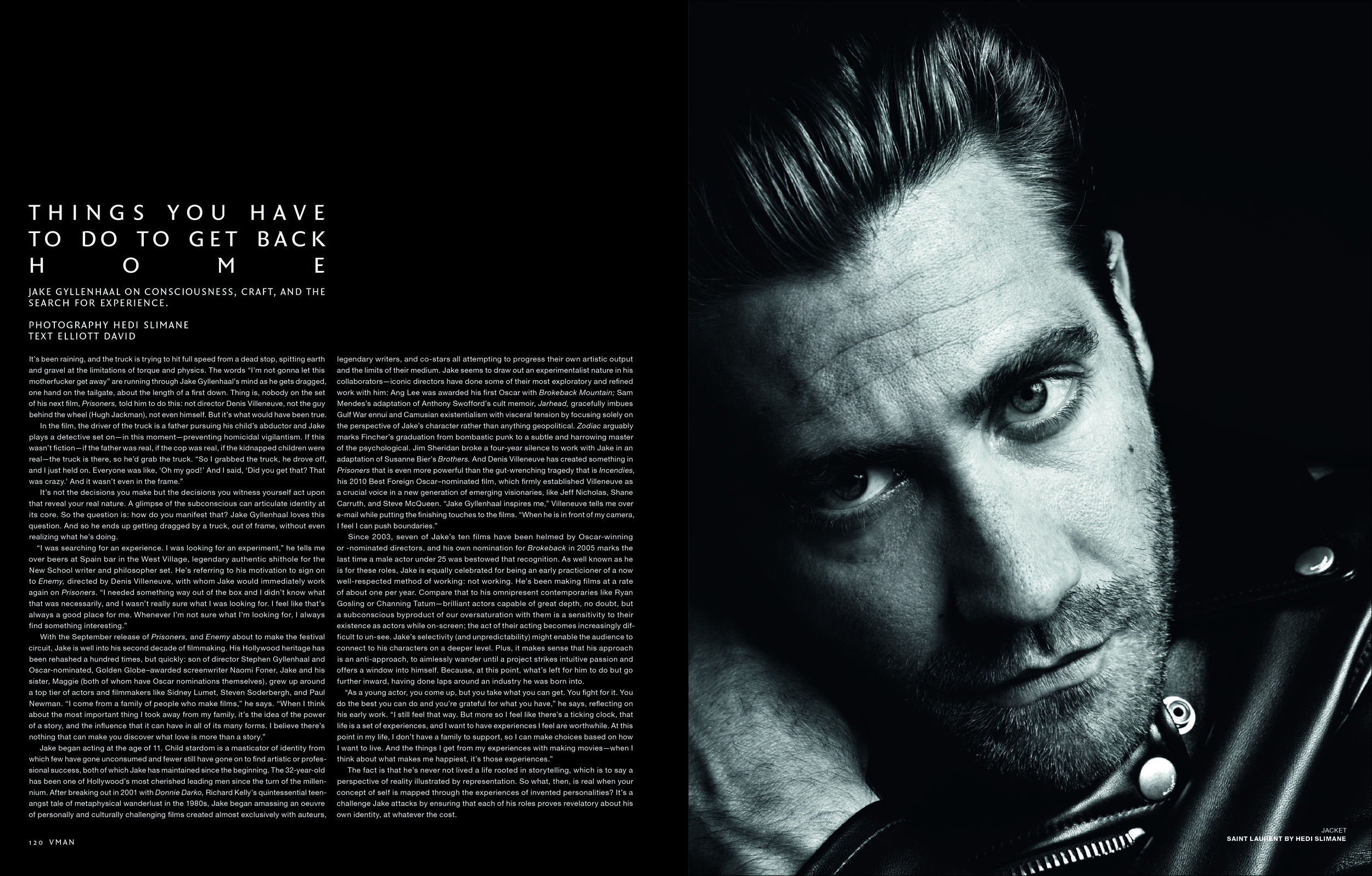
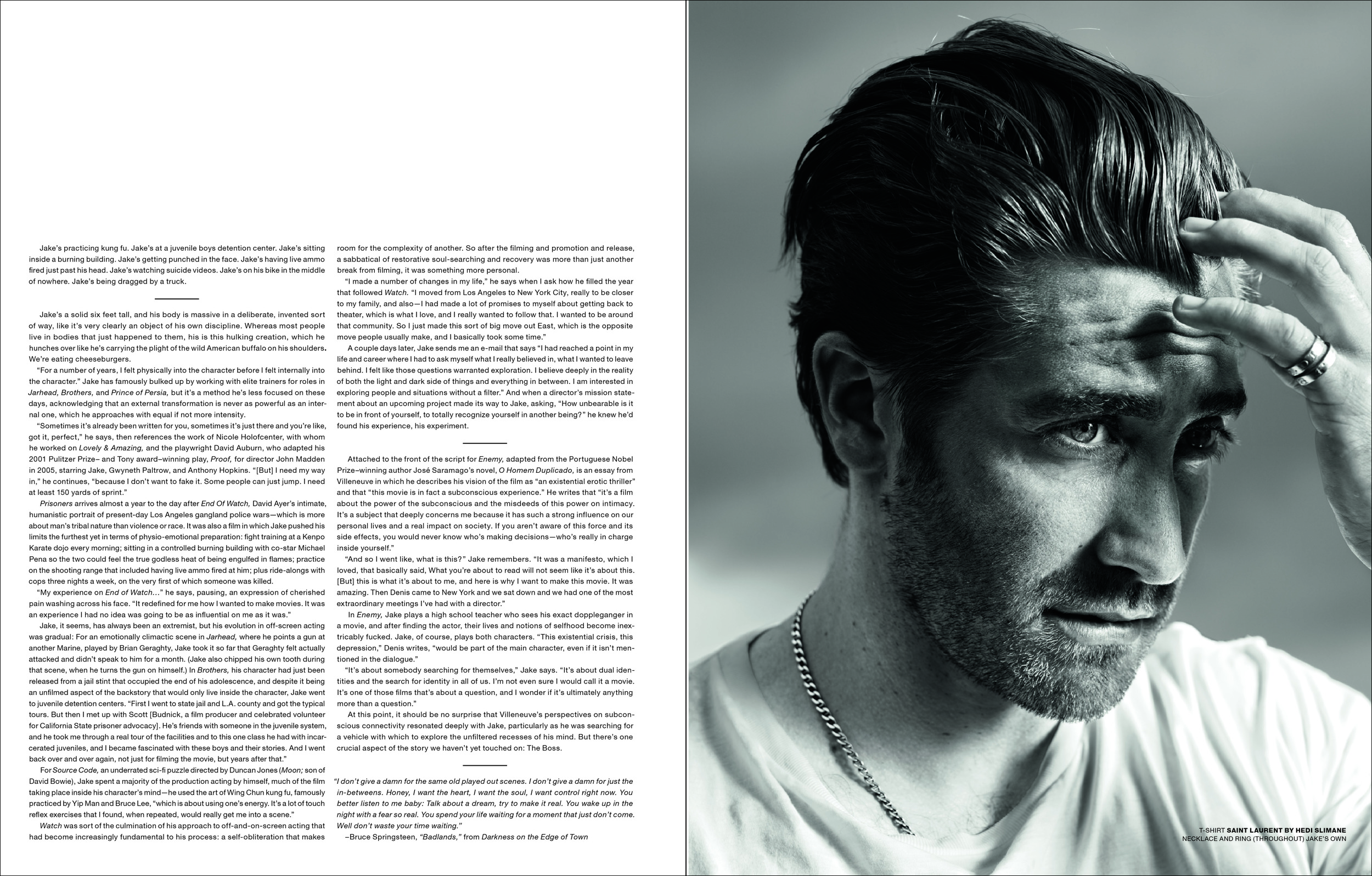
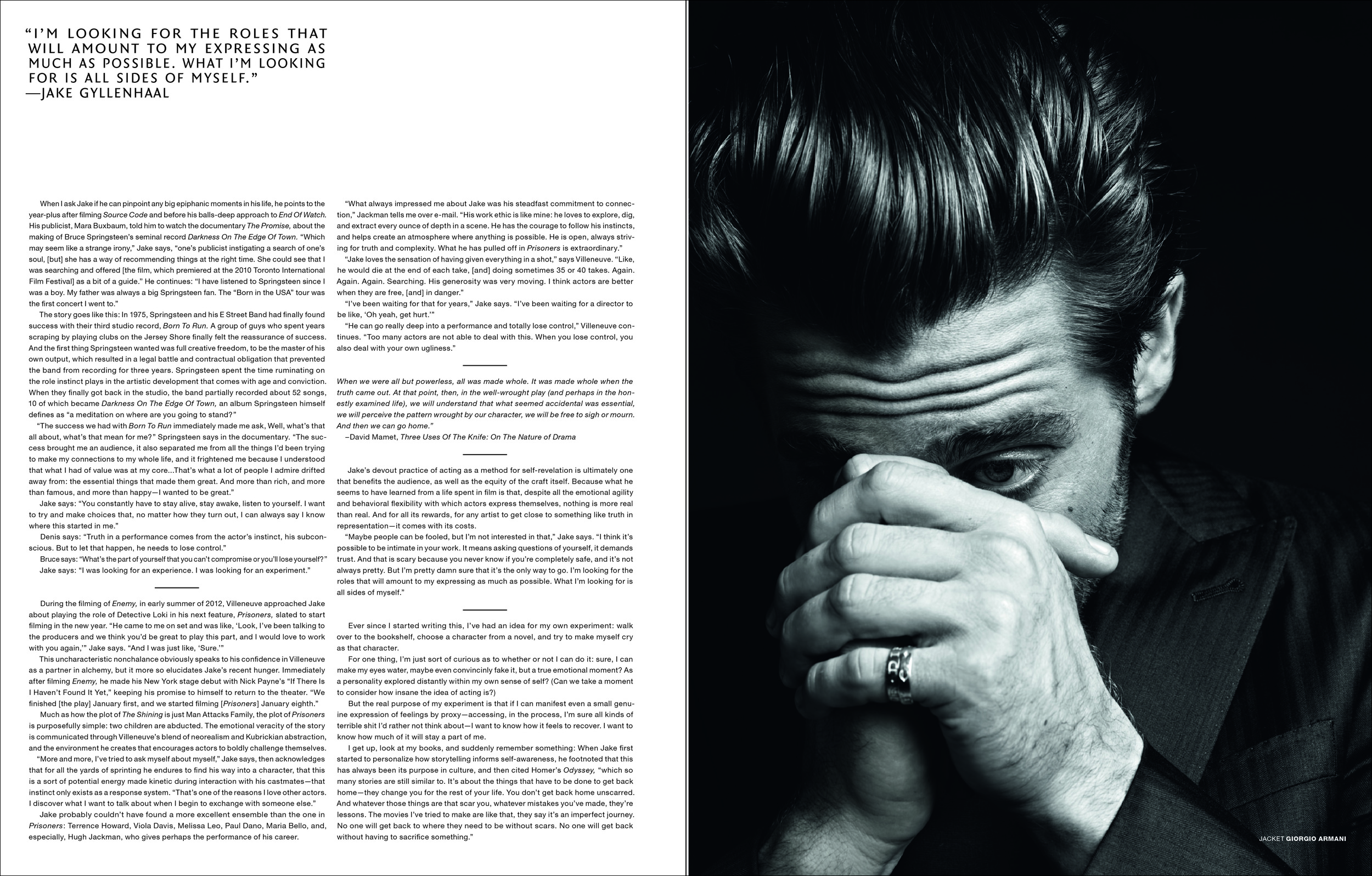
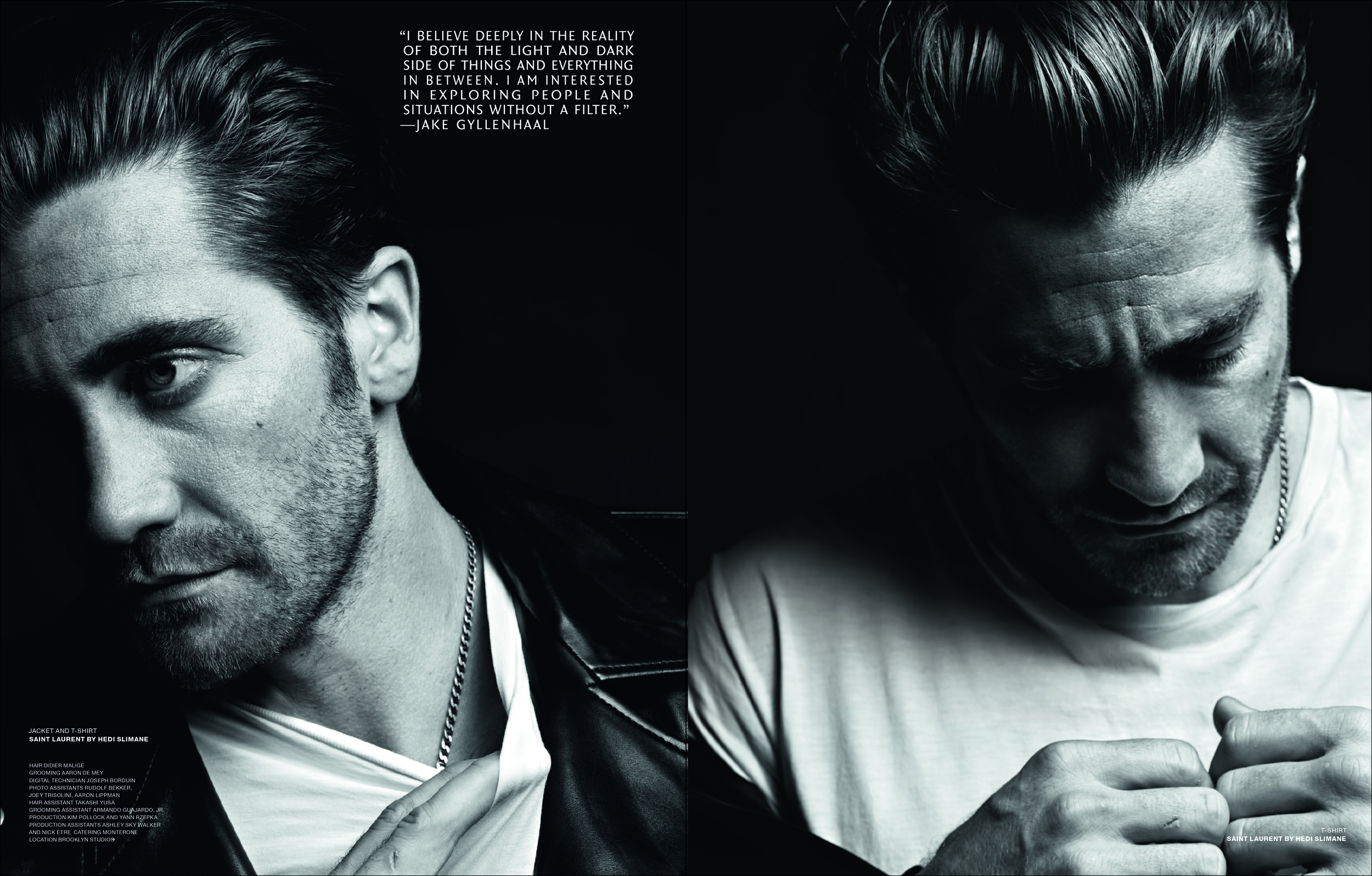
THINGS YOU HAVE TO DO TO GET BACK HOME
PHOTOGRAPHY HEDI SLIMANE
TEXT ELLIOTT DAVID
JAKE GYLLENHAAL ON CONSCIOUSNESS, CRAFT, AND THE SEARCH FOR EXPERIENCE
It’s been raining, and the truck is trying to hit full speed from a dead stop, spitting earth and gravel at the limitations of torque and physics. The words “I’m not gonna let this motherfucker get away” are running through Jake Gyllenhaal’s mind as he gets dragged, one hand on the tailgate, about the length of a first down. Thing is, nobody on the set of his next film,Prisoners, told him to do this: not director Denis Villeneuve, not the guy behind the wheel (Hugh Jackman), not even himself. But it’s what would have been true.
In the film, the driver of the truck is a father pursuing his child’s abductor and Jake plays a detective set on—in this moment—preventing homicidal vigilantism. If this wasn’t fiction—if the father was real, if the cop was real, if the kidnapped children were real—the truck is there, so he’d grab the truck. “So I grabbed the truck, he drove off, and I just held on. Everyone was like, ‘Oh my god!’ And I said, ‘Did you get that? That was crazy.’ And it wasn’t even in the frame.”
It’s not the decisions you make but the decisions you witness yourself act upon that reveal your real nature. A glimpse of the subconscious can articulate identity at its core. So the question is: how do you manifest that? Jake Gyllenhaal loves this question. And so he ends up getting dragged by a truck, out of frame, without even realizing what he’s doing.
“I was searching for an experience. I was looking for an experiment,” he tells me over beers at Spain bar in the West Village, legendary authentic shithole for the New School writer and philosopher set. He’s referring to his motivation to sign on to Enemy, directed by Denis Villeneuve, with whom Jake would immediately work again on Prisoners. “I needed something way out of the box and I didn’t know what that was necessarily, and I wasn’t really sure what I was looking for. I feel like that’s always a good place for me. Whenever I’m not sure what I’m looking for, I always find something interesting.”
With the September release of Prisoners, and Enemy about to make the festival circuit, Jake is well into his second decade of filmmaking. His Hollywood heritage has been rehashed a hundred times, but quickly: son of director Stephen Gyllenhaal and Oscar-nominated, Golden Globe–awarded screenwriter Naomi Foner, Jake and his sister, Maggie (both of whom have Oscar nominations themselves), grew up around a top tier of actors and filmmakers like Sidney Lumet, Steven Soderbergh, and Paul Newman. “I come from a family of people who make films,” he says. “When I think about the most important thing I took away from my family, it’s the idea of the power of a story, and the influence that it can have in all of its many forms. I believe there’s nothing that can make you discover what love is more than a story.”
Jake began acting at the age of 11. Child stardom is a masticator of identity from which few have gone unconsumed and fewer still have gone on to find artistic or professional success, both of which Jake has maintained since the beginning. The 32-year-old has been one of Hollywood’s most cherished leading men since the turn of the millennium. After breaking out in 2001 with Donnie Darko, Richard Kelly’s quintessential teen-angst tale of metaphysical wanderlust in the 1980s, Jake began amassing an oeuvre of personally and culturally challenging films created almost exclusively with auteurs, legendary writers, and co-stars all attempting to progress their own artistic output and the limits of their medium. Jake seems to draw out an experimentalist nature in his collaborators—iconic directors have done some of their most exploratory and refined work with him: Ang Lee was awarded his first Oscar with Brokeback Mountain; Sam Mendes’s adaptation of Anthony Swofford’s cult memoir, Jarhead, gracefully imbues Gulf War ennui and Camusian existentialism with visceral tension by focusing solely on the perspective of Jake’s character rather than anything geopolitical. Zodiac arguably marks Fincher’s graduation from bombastic punk to a subtle and harrowing master of the psychological. Jim Sheridan broke a four-year silence to work with Jake in an adaptation of Susanne Bier’s Brothers. And Denis Villeneuve has created something in Prisoners that is even more powerful than the gut-wrenching tragedy that is Incendies, his 2010 Best Foreign Oscar–nominated film, which firmly established Villeneuve as a crucial voice in a new generation of emerging visionaries, like Jeff Nichols, Shane Carruth, and Steve McQueen. “Jake Gyllenhaal inspires me,” Villeneuve tells me over e-mail while putting the finishing touches to the films. “When he is in front of my camera, I feel I can push boundaries.”
Since 2003, seven of Jake’s ten films have been helmed by Oscar-winning or -nominated directors, and his own nomination for Brokeback in 2005 marks the last time a male actor under 25 was bestowed that recognition. As well known as he is for these roles, Jake is equally celebrated for being an early practicioner of a now well-respected method of working: not working. He’s been making films at a rate of about one per year. Compare that to his omnipresent contemporaries like Ryan Gosling or Channing Tatum—brilliant actors capable of great depth, no doubt, but a subconscious byproduct of our oversaturation with them is a sensitivity to their existence as actors while on-screen; the act of their acting becomes increasingly difficult to un-see. Jake’s selectivity (and unpredictability) might enable the audience to connect to his characters on a deeper level. Plus, it makes sense that his approach is an anti-approach, to aimlessly wander until a project strikes intuitive passion and offers a window into himself. Because, at this point, what’s left for him to do but go further inward, having done laps around an industry he was born into.
“As a young actor, you come up, but you take what you can get. You fight for it. You do the best you can do and you’re grateful for what you have,” he says, reflecting on his early work. “I still feel that way. But more so I feel like there’s a ticking clock, that life is a set of experiences, and I want to have experiences I feel are worthwhile. At this point in my life, I don’t have a family to support, so I can make choices based on how I want to live. And the things I get from my experiences with making movies—when I think about what makes me happiest, it’s those experiences.”
The fact is that he’s never not lived a life rooted in storytelling, which is to say a perspective of reality illustrated by representation. So what, then, is real when your concept of self is mapped through the experiences of invented personalities? It’s a challenge Jake attacks by ensuring that each of his roles proves revelatory about his own identity, at whatever the cost.
—
Jake’s practicing kung fu. Jake’s at a juvenile boys detention center. Jake’s sitting inside a burning building. Jake’s getting punched in the face. Jake’s having live ammo fired just past his head. Jake’s watching suicide videos. Jake’s on his bike in the middle of nowhere. Jake’s being dragged by a truck.
—
Jake’s a solid six feet tall, and his body is massive in a deliberate, invented sort of way, like it’s very clearly an object of his own discipline. Whereas most people live in bodies that just happened to them, his is this hulking creation, which he hunches over like he’s carrying the plight of the wild American buffalo on his shoulders. We’re eating cheeseburgers.
“For a number of years, I felt physically into the character before I felt internally into the character.” Jake has famously bulked up by working with elite trainers for roles in Jarhead, Brothers, and Prince of Persia, but it’s a method he’s less focused on these days, acknowledging that an external transformation is never as powerful as an internal one, which he approaches with equal if not more intensity.
“Sometimes it’s already been written for you, sometimes it’s just there and you’re like, got it, perfect,” he says, then references the work of Nicole Holofcenter, with whom he worked on Lovely & Amazing, and the playwright David Auburn, who adapted his 2001 Pulitzer Prize– and Tony award–winning play, Proof, for director John Madden in 2005, starring Jake, Gwyneth Paltrow, and Anthony Hopkins. “[But] I need my way in,” he continues, “because I don’t want to fake it. Some people can just jump. I need at least 150 yards of sprint.”
Prisoners arrives almost a year to the day after End Of Watch, David Ayer’s intimate, humanistic portrait of present-day Los Angeles gangland police wars—which is more about man’s tribal nature than violence or race. It was also a film in which Jake pushed his limits the furthest yet in terms of physio-emotional preparation: fight training at a Kenpo Karate dojo every morning; sitting in a controlled burning building with co-star Michael Pena so the two could feel the true godless heat of being engulfed in flames; practice on the shooting range that included having live ammo fired at him; plus ride-alongs with cops three nights a week, on the very first of which someone was killed.
“My experience on End of Watch…” he says, pausing, an expression of cherished pain washing across his face. “It redefined for me how I wanted to make movies. It was an experience I had no idea was going to be as influential on me as it was.”
Jake, it seems, has always been an extremist, but his evolution in off-screen acting was gradual: For an emotionally climactic scene in Jarhead, where he points a gun at another Marine, played by Brian Geraghty, Jake took it so far that Geraghty felt actually attacked and didn’t speak to him for a month. (Jake also chipped his own tooth during that scene, when he turns the gun on himself.) In Brothers, his character had just been released from a jail stint that occupied the end of his adolescence, and despite it being an unfilmed aspect of the backstory that would only live inside the character, Jake went to juvenile detention centers. “First I went to state jail and L.A. county and got the typical tours. But then I met up with Scott [Budnick, a film producer and celebrated volunteer for California State prisoner advocacy]. He’s friends with someone in the juvenile system, and he took me through a real tour of the facilities and to this one class he had with incarcerated juveniles, and I became fascinated with these boys and their stories. And I went back over and over again, not just for filming the movie, but years after that.”
For Source Code, an underrated sci-fi puzzle directed by Duncan Jones (Moon; son of David Bowie), Jake spent a majority of the production acting by himself, much of the film taking place inside his character’s mind—he used the art of Wing Chun kung fu, famously practiced by Yip Man and Bruce Lee, “which is about using one’s energy. It’s a lot of touch reflex exercises that I found, when repeated, would really get me into a scene.”
Watch was sort of the culmination of his approach to off-and-on-screen acting that had become increasingly fundamental to his process: a self-obliteration that makes room for the complexity of another. So after the filming and promotion and release, a sabbatical of restorative soul-searching and recovery was more than just another break from filming, it was something more personal.
“I made a number of changes in my life,” he says when I ask how he filled the year that followed Watch. “I moved from Los Angeles to New York City, really to be closer to my family, and also—I had made a lot of promises to myself about getting back to theater, which is what I love, and I really wanted to follow that. I wanted to be around that community. So I just made this sort of big move out East, which is the opposite move people usually make, and I basically took some time.”
A couple days later, Jake sends me an e-mail that says “I had reached a point in my life and career where I had to ask myself what I really believed in, what I wanted to leave behind. I felt like those questions warranted exploration. I believe deeply in the reality of both the light and dark side of things and everything in between. I am interested in exploring people and situations without a filter.” And when a director’s mission statement about an upcoming project made its way to Jake, asking, “How unbearable is it to be in front of yourself, to totally recognize yourself in another being?” he knew he’d found his experience, his experiment.
—
Attached to the front of the script for Enemy, adapted from the Portuguese Nobel Prize–winning author José Saramago’s novel, O Homem Duplicado, is an essay from Villeneuve in which he describes his vision of the film as “an existential erotic thriller” and that “this movie is in fact a subconscious experience.” He writes that “it’s a film about the power of the subconscious and the misdeeds of this power on intimacy. It’s a subject that deeply concerns me because it has such a strong influence on our personal lives and a real impact on society. If you aren’t aware of this force and its side effects, you would never know who’s making decisions—who’s really in charge inside yourself.”
“And so I went like, what is this?” Jake remembers. “It was a manifesto, which I loved, that basically said, What you’re about to read will not seem like it’s about this. [But] this is what it’s about to me, and here is why I want to make this movie. It was amazing. Then Denis came to New York and we sat down and we had one of the most extraordinary meetings I’ve had with a director.”
In Enemy, Jake plays a high school teacher who sees his exact doppleganger in a movie, and after finding the actor, their lives and notions of selfhood become inextricably fucked. Jake, of course, plays both characters. “This existential crisis, this depression,” Denis writes, “would be part of the main character, even if it isn’t mentioned in the dialogue.”
“It’s about somebody searching for themselves,” Jake says. “It’s about dual identities and the search for identity in all of us. I’m not even sure I would call it a movie. It’s one of those films that’s about a question, and I wonder if it’s ultimately anything more than a question.”
At this point, it should be no surprise that Villeneuve’s perspectives on subconscious connectivity resonated deeply with Jake, particularly as he was searching for a vehicle with which to explore the unfiltered recesses of his mind. But there’s one crucial aspect of the story we haven’t yet touched on: The Boss.
—
“I don’t give a damn for the same old played out scenes. I don’t give a damn for just the in-betweens. Honey, I want the heart, I want the soul, I want control right now. You better listen to me baby: Talk about a dream, try to make it real. You wake up in the night with a fear so real. You spend your life waiting for a moment that just don’t come. Well don’t waste your time waiting.”
–Bruce Springsteen, “Badlands,” from Darkness on the Edge of Town
—
When I ask Jake if he can pinpoint any big epiphanic moments in his life, he points to the year-plus after filming Source Code and before his balls-deep approach to End Of Watch. His publicist, Mara Buxbaum, told him to watch the documentaryThe Promise, about the making of Bruce Springsteen’s seminal record Darkness On The Edge Of Town. “Which may seem like a strange irony,” Jake says, “one’s publicist instigating a search of one’s soul, [but] she has a way of recommending things at the right time. She could see that I was searching and offered [the film, which premiered at the 2010 Toronto International Film Festival] as a bit of a guide.” He continues: “I have listened to Springsteen since I was a boy. My father was always a big Springsteen fan. The “Born in the USA” tour was the first concert I went to.”
The story goes like this: In 1975, Springsteen and his E Street Band had finally found success with their third studio record,Born To Run. A group of guys who spent years scraping by playing clubs on the Jersey Shore finally felt the reassurance of success. And the first thing Springsteen wanted was full creative freedom, to be the master of his own output, which resulted in a legal battle and contractual obligation that prevented the band from recording for three years. Springsteen spent the time ruminating on the role instinct plays in the artistic development that comes with age and conviction. When they finally got back in the studio, the band partially recorded about 52 songs, 10 of which became Darkness On The Edge Of Town, an album Springsteen himself defines as “a meditation on where are you going to stand?”
“The success we had with Born To Run immediately made me ask, Well, what’s that all about, what’s that mean for me?” Springsteen says in the documentary. “The success brought me an audience, it also separated me from all the things I’d been trying to make my connections to my whole life, and it frightened me because I understood that what I had of value was at my core...That’s what a lot of people I admire drifted away from: the essential things that made them great. And more than rich, and more than famous, and more than happy—I wanted to be great.”
Jake says: “You constantly have to stay alive, stay awake, listen to yourself. I want to try and make choices that, no matter how they turn out, I can always say I know where this started in me.”
Denis says: “Truth in a performance comes from the actor’s instinct, his subconscious. But to let that happen, he needs to lose control.”
Bruce says: “What’s the part of yourself that you can’t compromise or you’ll lose yourself?”
Jake says: “I was looking for an experience. I was looking for an experiment.”
—
During the filming of Enemy, in early summer of 2012, Villeneuve approached Jake about playing the role of Detective Loki in his next feature, Prisoners, slated to start filming in the new year. “He came to me on set and was like, ‘Look, I’ve been talking to the producers and we think you’d be great to play this part, and I would love to work with you again,’” Jake says. “And I was just like, ‘Sure.’”
This uncharacteristic nonchalance obviously speaks to his confidence in Villeneuve as a partner in alchemy, but it more so elucidates Jake’s recent hunger. Immediately after filming Enemy, he made his New York stage debut with Nick Payne’s “If There Is I Haven’t Found It Yet,” keeping his promise to himself to return to the theater. “We finished [the play] January first, and we started filming [Prisoners] January eighth.”
Much as how the plot of The Shining is just Man Attacks Family, the plot of Prisoners is purposefully simple: two children are abducted. The emotional veracity of the story is communicated through Villeneuve’s blend of neorealism and Kubrickian abstraction, and the environment he creates that encourages actors to boldly challenge themselves. “More and more, I’ve tried to ask myself about myself,” Jake says, then acknowledges that for all the yards of sprinting he endures to find his way into a character, that this is a sort of potential energy made kinetic during interaction with his castmates—that instinct only exists as a response system. “That’s one of the reasons I love other actors. I discover what I want to talk about when I begin to exchange with someone else.”
Jake probably couldn’t have found a more excellent ensemble than the one in Prisoners: Terrence Howard, Viola Davis, Melissa Leo, Paul Dano, Maria Bello, and, especially, Hugh Jackman, who gives perhaps the performance of his career.
“What always impressed me about Jake was his steadfast commitment to connection,” Jackman tells me over e-mail. “His work ethic is like mine: he loves to explore, dig, and extract every ounce of depth in a scene. He has the courage to follow his instincts, and helps create an atmosphere where anything is possible. He is open, always striving for truth and complexity. What he has pulled off in Prisoners is extraordinary.”
“Jake loves the sensation of having given everything in a shot,” says Villeneuve. “Like, he would die at the end of each take, [and] doing sometimes 35 or 40 takes. Again. Again. Again. Searching. His generosity was very moving. I think actors are better when they are free, [and] in danger.”
“I’ve been waiting for that for years,” Jake says. “I’ve been waiting for a director to be like, ‘Oh yeah, get hurt.’”
“He can go really deep into a performance and totally lose control,” Villeneuve continues. “Too many actors are not able to deal with this. When you lose control, you also deal with your own ugliness.”
—
"When we were all but powerless, all was made whole. It was made whole when the truth came out. At that point, then, in the well-wrought play (and perhaps in the honestly examined life), we will understand that what seemed accidental was essential, we will perceive the pattern wrought by our character, we will be free to sigh or mourn. And then we can go home.”
–David Mamet, Three Uses Of The Knife: On The Nature of Drama
—
Jake’s devout practice of acting as a method for self-revelation is ultimately one that benefits the audience, as well as the equity of the craft itself. Because what he seems to have learned from a life spent in film is that, despite all the emotional agility and behavioral flexibility with which actors express themselves, nothing is more real than real. And for all its rewards, for any artist to get close to something like truth in representation—it comes with its costs.
“Maybe people can be fooled, but I’m not interested in that,” Jake says. “I think it’s possible to be intimate in your work. It means asking questions of yourself, it demands trust. And that is scary because you never know if you’re completely safe, and it’s not always pretty. But I’m pretty damn sure that it’s the only way to go. I’m looking for the roles that will amount to my expressing as much as possible. What I’m looking for is all sides of myself.”
—
Ever since I started writing this, I’ve had an idea for my own experiment: walk over to the bookshelf, choose a character from a novel, and try to make myself cry as that character.
For one thing, I’m just sort of curious as to whether or not I can do it: sure, I can make my eyes water, maybe even convincinly fake it, but a true emotional moment? As a personality explored distantly within my own sense of self? (Can we take a moment to consider how insane the idea of acting is?)
But the real purpose of my experiment is that if I can manifest even a small genuine expression of feelings by proxy—accessing, in the process, I’m sure all kinds of terrible shit I’d rather not think about—I want to know how it feels to recover. I want to know how much of it will stay a part of me.
I get up, look at my books, and suddenly remember something: When Jake first started to personalize how storytelling informs self-awareness, he footnoted that this has always been its purpose in culture, and then cited Homer’s Odyssey, “which so many stories are still similar to. It’s about the things that have to be done to get back home—they change you for the rest of your life. You don’t get back home unscarred. And whatever those things are that scar you, whatever mistakes you’ve made, they’re lessons. The movies I’ve tried to make are like that, they say it’s an imperfect journey. No one will get back to where they need to be without scars. No one will get back without having to sacrifice something.”